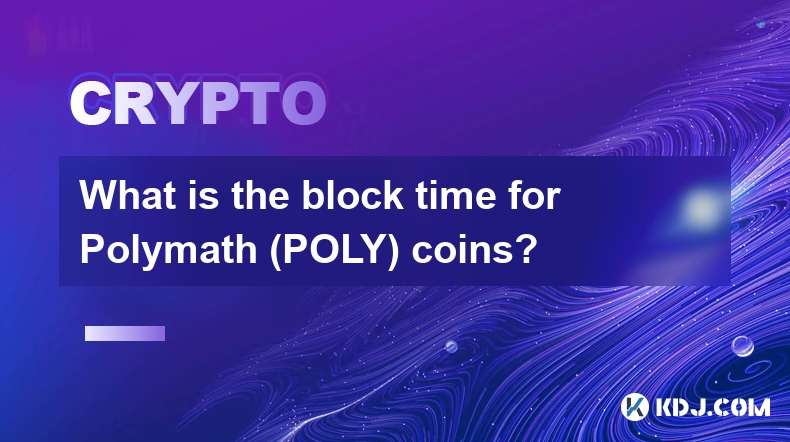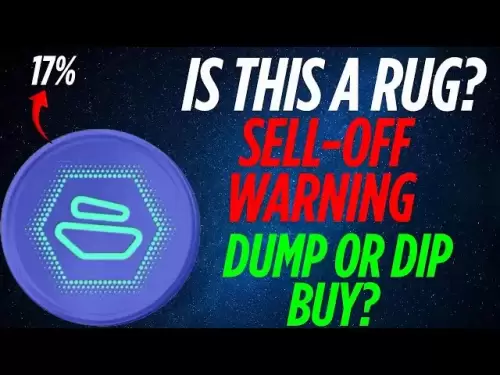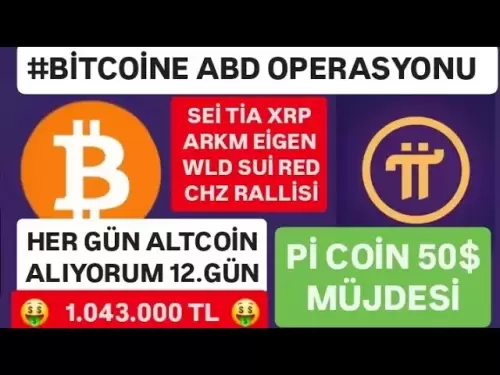-
 Bitcoin
Bitcoin $108,708.8110
0.60% -
 Ethereum
Ethereum $2,561.6057
1.91% -
 Tether USDt
Tether USDt $1.0001
-0.03% -
 XRP
XRP $2.2795
0.57% -
 BNB
BNB $662.2393
1.00% -
 Solana
Solana $153.1346
3.74% -
 USDC
USDC $1.0000
0.00% -
 TRON
TRON $0.2877
0.97% -
 Dogecoin
Dogecoin $0.1710
3.93% -
 Cardano
Cardano $0.5871
1.61% -
 Hyperliquid
Hyperliquid $39.6663
1.68% -
 Sui
Sui $2.9032
0.79% -
 Bitcoin Cash
Bitcoin Cash $496.1879
1.71% -
 Chainlink
Chainlink $13.5807
3.01% -
 UNUS SED LEO
UNUS SED LEO $9.0777
0.61% -
 Stellar
Stellar $0.2514
4.51% -
 Avalanche
Avalanche $18.1761
1.86% -
 Shiba Inu
Shiba Inu $0.0...01173
1.72% -
 Toncoin
Toncoin $2.8010
-4.23% -
 Hedera
Hedera $0.1594
3.21% -
 Litecoin
Litecoin $87.0257
-0.53% -
 Monero
Monero $319.1217
1.79% -
 Polkadot
Polkadot $3.3853
0.68% -
 Dai
Dai $0.9999
-0.01% -
 Ethena USDe
Ethena USDe $1.0003
0.02% -
 Bitget Token
Bitget Token $4.3420
-0.97% -
 Uniswap
Uniswap $7.3772
1.39% -
 Aave
Aave $286.6277
5.61% -
 Pepe
Pepe $0.0...09994
2.33% -
 Pi
Pi $0.4589
1.76%
What is the block time for Polymath (POLY) coins?
Despite inherent delays due to Ethereum's variable block time, Polymath's POLY transactions benefit from its robust security and decentralized framework.
Dec 27, 2024 at 06:23 pm

Key Points:
- Understanding Block Time in Cryptocurrency
- Polymath (POLY) Block Time and Considerations
- Factors Influencing Block Times
- Implications of Block Time for POLY
What is Block Time in Cryptocurrency?
Block time, also known as block interval, refers to the average time taken to create a new block in a blockchain network. Blockchains record transactions in interconnected blocks, and the time between the creation of successive blocks determines the throughput and efficiency of the network. Shorter block times generally allow for faster transaction confirmation and higher transaction capacity.
Polymath (POLY) Block Time and Considerations
Polymath utilizes the Ethereum blockchain, which has a variable block time. The average block time for Ethereum is approximately 12 seconds, although it can fluctuate depending on network traffic. POLY transactions are subject to this block time, meaning that confirmations and settlements can take up to 12 seconds on average.
Advantages of ETH's Block Time for POLY:
- Ethereum's security and decentralization provide a robust foundation for POLY transactions.
- The variable block time can accommodate varying network loads and transaction volumes.
Considerations of ETH's Block Time for POLY:
- Slower block times may result in delayed confirmations and longer waiting periods for settlement.
- Ethereum's block time may impact the scalability and transaction fees for POLY.
Factors Influencing Block Times
Several factors can influence block times in cryptocurrencies, including:
- Network Traffic: Higher network usage can increase block times as more transactions compete for limited block space.
- Block Size: Larger block sizes can accommodate more transactions but may slow down block creation and validation.
- Validation Time: The time required for nodes to validate transactions and reach consensus affects block times.
Implications of Block Time for POLY
POLY's reliance on Ethereum's block time has implications for transaction handling and user experience:
- Confirmation Times: Confirmations for POLY transactions will depend on the prevailing block time of Ethereum, which averages at 12 seconds.
- Scalability: Ethereum's scalable block times can accommodate changes in network demand, but extended block times may limit POLY's scalability.
- Transaction Fees: Block times can influence transaction fees, especially during periods of high network congestion, when fees may increase to incentivize faster confirmation.
FAQs
- Is POLY's block time fixed?
No, POLY's block time is dependent on Ethereum's block time, which is variable.
- What is a good block time for a cryptocurrency like POLY?
The optimal block time depends on factors such as transaction volume, scalability, and security requirements. A block time between 10-20 seconds is considered reasonable for cryptocurrencies like POLY.
- How can I reduce the impact of longer block times on POLY transactions?
Consider using layer-2 solutions or sidechains that offer faster transaction confirmation times and lower fees.
Disclaimer:info@kdj.com
The information provided is not trading advice. kdj.com does not assume any responsibility for any investments made based on the information provided in this article. Cryptocurrencies are highly volatile and it is highly recommended that you invest with caution after thorough research!
If you believe that the content used on this website infringes your copyright, please contact us immediately (info@kdj.com) and we will delete it promptly.
- Bitcoin, Investment, Safe Buy: Navigating the Crypto Landscape in 2025
- 2025-07-08 06:30:12
- DegeCoin, Solana, and Meme Tokens: Riding the Wave or a Wipeout?
- 2025-07-08 07:10:12
- Brett Price, Arctic Pablo, and Meme Coins: What's the Hype?
- 2025-07-08 06:50:12
- Cryptos, Potential Gains, Early Investment: Spotting the Next Big Thing
- 2025-07-08 06:30:12
- Solana ETF Speculation Heats Up: SEC Deadlines and SOL Price Swings
- 2025-07-08 07:10:12
- PUMP Token, Solana Adoption, and Token Sales: What's the Buzz?
- 2025-07-08 07:15:12
Related knowledge

How to customize USDT TRC20 mining fees? Flexible adjustment tutorial
Jun 13,2025 at 01:42am
Understanding USDT TRC20 Mining FeesMining fees on the TRON (TRC20) network are essential for processing transactions. Unlike Bitcoin or Ethereum, where miners directly validate transactions, TRON uses a delegated proof-of-stake (DPoS) mechanism. However, users still need to pay bandwidth and energy fees, which are collectively referred to as 'mining fe...

USDT TRC20 transaction is stuck? Solution summary
Jun 14,2025 at 11:15pm
Understanding USDT TRC20 TransactionsWhen users mention that a USDT TRC20 transaction is stuck, they typically refer to a situation where the transfer of Tether (USDT) on the TRON blockchain has not been confirmed for an extended period. This issue may arise due to various reasons such as network congestion, insufficient transaction fees, or wallet-rela...

How to cancel USDT TRC20 unconfirmed transactions? Operation guide
Jun 13,2025 at 11:01pm
Understanding USDT TRC20 Unconfirmed TransactionsWhen dealing with USDT TRC20 transactions, it’s crucial to understand what an unconfirmed transaction means. An unconfirmed transaction is one that has been broadcasted to the blockchain network but hasn’t yet been included in a block. This typically occurs due to low transaction fees or network congestio...

How to check USDT TRC20 balance? Introduction to multiple query methods
Jun 21,2025 at 02:42am
Understanding USDT TRC20 and Its ImportanceUSDT (Tether) is one of the most widely used stablecoins in the cryptocurrency market. It exists on multiple blockchain networks, including TRC20, which operates on the Tron (TRX) network. Checking your USDT TRC20 balance accurately is crucial for users who hold or transact with this asset. Whether you're sendi...

What to do if USDT TRC20 transfers are congested? Speed up trading skills
Jun 13,2025 at 09:56am
Understanding USDT TRC20 Transfer CongestionWhen transferring USDT TRC20, users may occasionally experience delays or congestion. This typically occurs due to network overload on the TRON blockchain, which hosts the TRC20 version of Tether. Unlike the ERC20 variant (which runs on Ethereum), TRC20 transactions are generally faster and cheaper, but during...

The relationship between USDT TRC20 and TRON chain: technical background analysis
Jun 12,2025 at 01:28pm
What is USDT TRC20?USDT TRC20 refers to the Tether (USDT) token issued on the TRON blockchain using the TRC-20 standard. Unlike the more commonly known ERC-20 version of USDT (which runs on Ethereum), the TRC-20 variant leverages the TRON network's infrastructure for faster and cheaper transactions. The emergence of this version came as part of Tether’s...

How to customize USDT TRC20 mining fees? Flexible adjustment tutorial
Jun 13,2025 at 01:42am
Understanding USDT TRC20 Mining FeesMining fees on the TRON (TRC20) network are essential for processing transactions. Unlike Bitcoin or Ethereum, where miners directly validate transactions, TRON uses a delegated proof-of-stake (DPoS) mechanism. However, users still need to pay bandwidth and energy fees, which are collectively referred to as 'mining fe...

USDT TRC20 transaction is stuck? Solution summary
Jun 14,2025 at 11:15pm
Understanding USDT TRC20 TransactionsWhen users mention that a USDT TRC20 transaction is stuck, they typically refer to a situation where the transfer of Tether (USDT) on the TRON blockchain has not been confirmed for an extended period. This issue may arise due to various reasons such as network congestion, insufficient transaction fees, or wallet-rela...

How to cancel USDT TRC20 unconfirmed transactions? Operation guide
Jun 13,2025 at 11:01pm
Understanding USDT TRC20 Unconfirmed TransactionsWhen dealing with USDT TRC20 transactions, it’s crucial to understand what an unconfirmed transaction means. An unconfirmed transaction is one that has been broadcasted to the blockchain network but hasn’t yet been included in a block. This typically occurs due to low transaction fees or network congestio...

How to check USDT TRC20 balance? Introduction to multiple query methods
Jun 21,2025 at 02:42am
Understanding USDT TRC20 and Its ImportanceUSDT (Tether) is one of the most widely used stablecoins in the cryptocurrency market. It exists on multiple blockchain networks, including TRC20, which operates on the Tron (TRX) network. Checking your USDT TRC20 balance accurately is crucial for users who hold or transact with this asset. Whether you're sendi...

What to do if USDT TRC20 transfers are congested? Speed up trading skills
Jun 13,2025 at 09:56am
Understanding USDT TRC20 Transfer CongestionWhen transferring USDT TRC20, users may occasionally experience delays or congestion. This typically occurs due to network overload on the TRON blockchain, which hosts the TRC20 version of Tether. Unlike the ERC20 variant (which runs on Ethereum), TRC20 transactions are generally faster and cheaper, but during...

The relationship between USDT TRC20 and TRON chain: technical background analysis
Jun 12,2025 at 01:28pm
What is USDT TRC20?USDT TRC20 refers to the Tether (USDT) token issued on the TRON blockchain using the TRC-20 standard. Unlike the more commonly known ERC-20 version of USDT (which runs on Ethereum), the TRC-20 variant leverages the TRON network's infrastructure for faster and cheaper transactions. The emergence of this version came as part of Tether’s...
See all articles

























































































